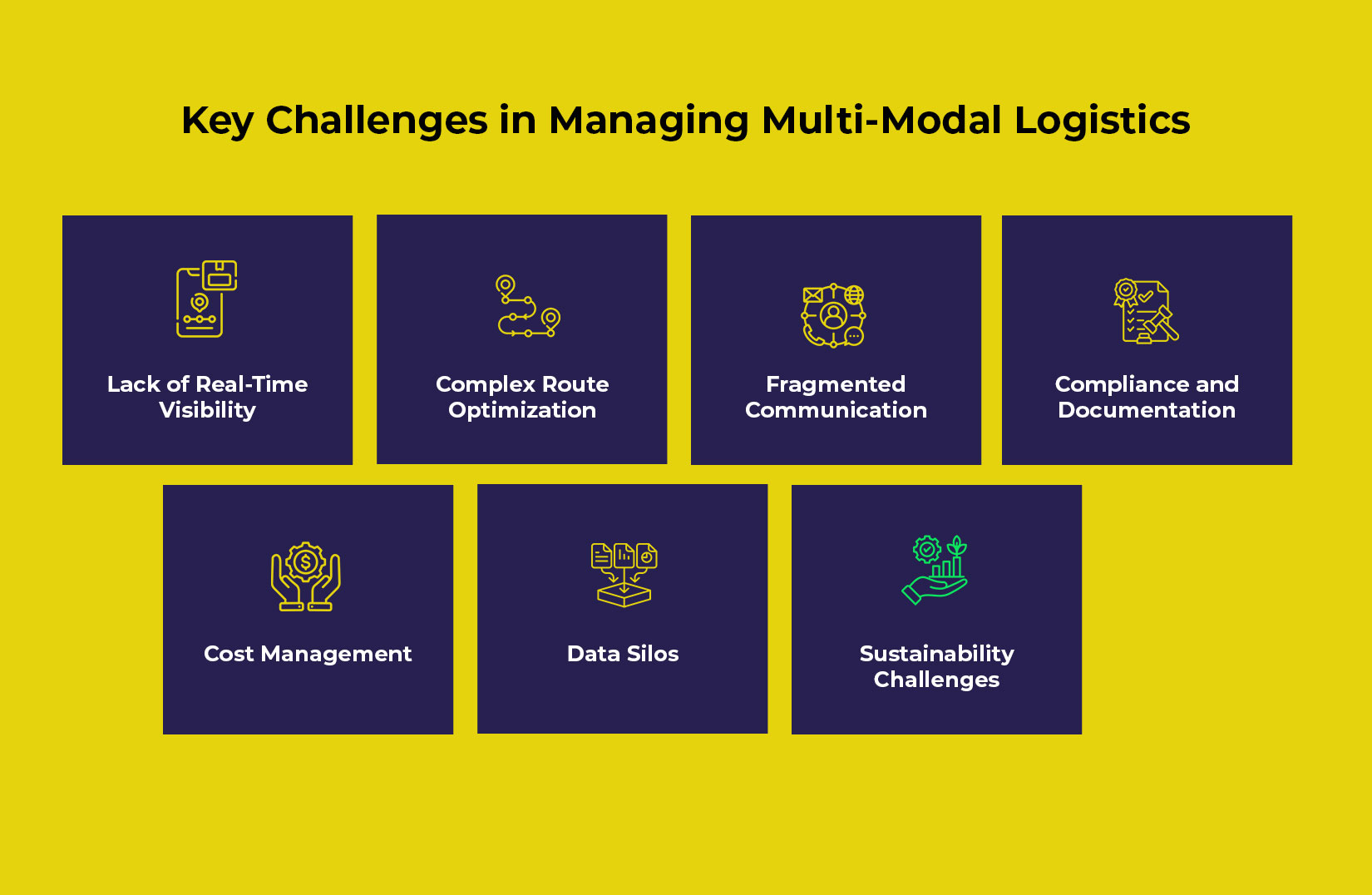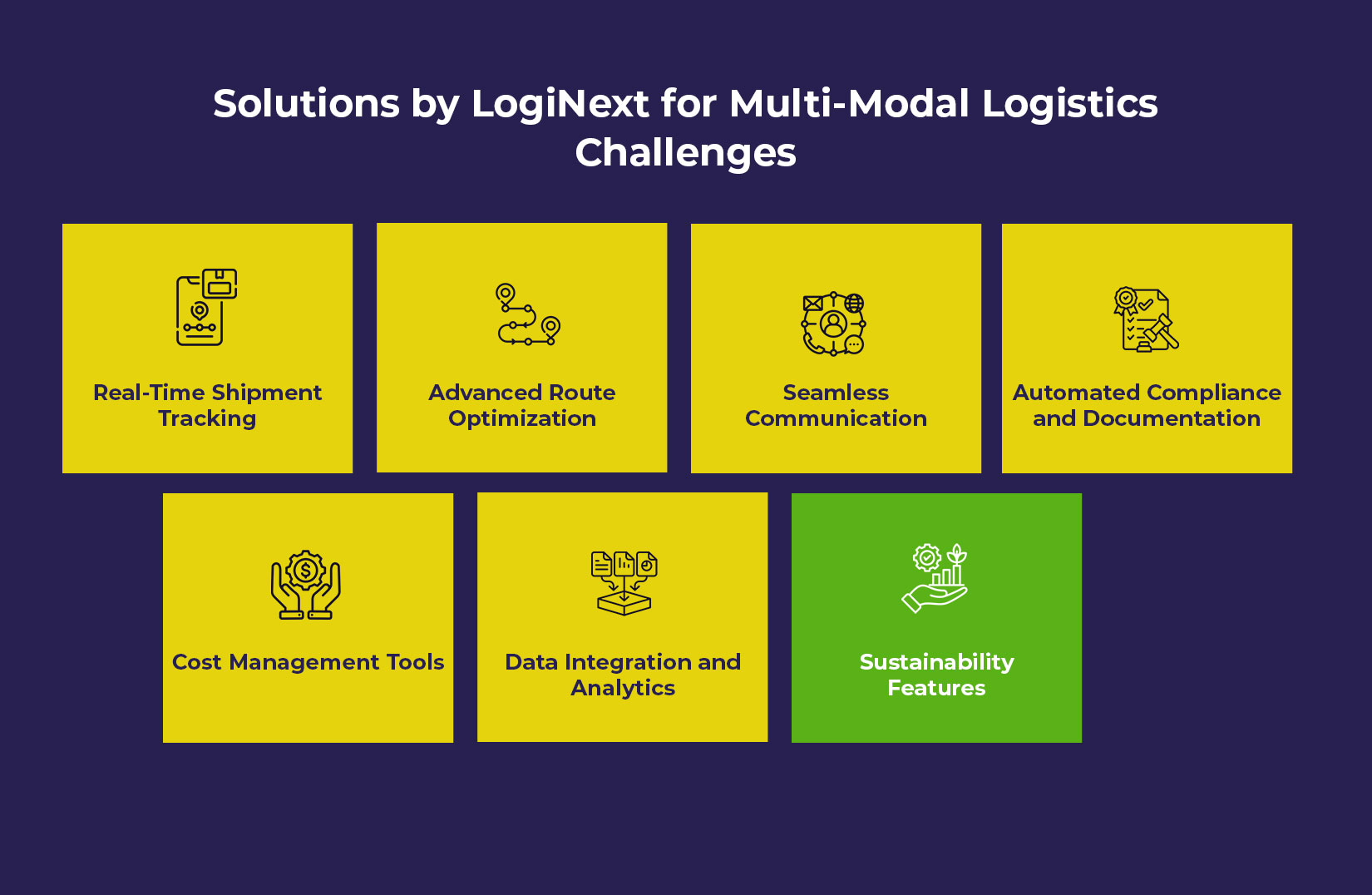Managing multi-modal logistics is a complex task in today’s fast-paced supply chain environment. As businesses strive to meet customer expectations for faster and more reliable deliveries, the need for efficient logistics management software has never been greater. Multi-modal logistics involves the use of different transportation modes. Modes such as air, sea, rail and road are used to move goods from one place to another. However, coordinating these modes effectively presents numerous challenges. A report by Allied Market Research predicts that the global logistics market will reach $12.9 trillion by 2027. It is expected to grow at a CAGR of 6.5% from 2020 to 2027. This underscores the increasing complexity and importance of logistics management.
Key Challenges in Managing Multi-Modal Logistics

1. Lack of Real-Time Visibility:
One of the biggest challenges in multi-modal logistics is the lack of real-time visibility across the entire supply chain. According to a study by Forbes, 62% of companies have limited visibility into their supply chains. Businesses often struggle to track shipments when goods switch the mode of transportation, leading to delays and inefficiencies.
2. Complex Route Optimization:
Coordinating routes across multiple transportation modes is a daunting task. Different modes have varying transit times. Without a logistics management platform with route optimization features, businesses risk increased transit times and higher operational costs. Research by MIT Center for Transportation & Logistics shows that optimized route planning can reduce transportation costs by up to 30%.
3. Fragmented Communication:
When managing multiple transportation providers and modes, communication can become fragmented. Miscommunication or delays in information sharing can result in lost shipments, delivery delays and dissatisfied customers. A Supply Chain Dive survey shows, 45% of logistics professionals cite poor communication as a major challenge in multi-modal logistics.
4. Communication and Documentation:
Each mode of transport comes with its own set of regulations and documentation requirements. Managing these documents manually can lead to errors, delays and compliance issues. A study by the World Bank reveals that inefficient documentation processes can increase shipping times by up to 20%, affecting overall logistics performance.
5. Cost Management:
Multi-modal logistics often involves fluctuating transportation costs, including fuel prices, port fees and customs duties. Without the best logistics management software, businesses find it difficult to track and manage these costs effectively. A report by McKinsey & Company says, companies that implement advanced logistics solutions can reduce logistics costs by 15% to 20%.
6. Data Silos:
Data silos occur when different departments or transportation providers use separate systems that don’t communicate with each other. This can lead to fragmented data, making it challenging to get a holistic view of the supply chain. Gartner reports that 87% of supply chain professionals consider data integration a top priority for improving logistics operations.
7. Sustainability Challenges:
With growing emphasis on sustainability, businesses are under pressure to reduce their carbon footprint. However, achieving this goal in multi-modal logistics without compromising efficiency is a significant challenge. According to the International Transport Forum, freight transport accounts for 8% of global CO2 emissions, highlighting the need for more sustainable logistics practices.
Solutions by LogiNext for Multi-Modal Logistics Challenges

LogiNext offers a comprehensive logistics management solution that addresses the challenges of managing multi-modal logistics. Here’s how LogiNext’s platform helps businesses streamline their operations:
1. Real-Time Shipment Tracking:
LogiNext’s logistics management software provides real-time visibility across all transportation modes. The platform uses advanced tracking technologies to help businesses monitor their shipments at every stage of the journey. This reduces delays and improves customer satisfaction. According to a study by Deloitte, companies with real-time visibility into their supply chains experience 20% fewer delays.
2. Advanced Route Optimization:
LogiNext’s logistics management platform with route optimization features helps businesses plan the most efficient routes across different modes of transportation. It considers factors such as transit times, costs and regulations to optimize routes, ensuring faster deliveries and reduced fuel consumption. Research shows that businesses using logistics management software, can reduce fuel costs by up to 15%.
3. Seamless Communication:
The platform acts as a centralized hub for communication, ensuring all stakeholders from transportation providers to warehouse managers are in sync. This seamless integration reduces miscommunication and enhances operational efficiency. A report by Capgemini states, companies that improve communication within their supply chains see a 12% increase in customer satisfaction.
4. Automated Compliance and Documentation:
LogiNext’s software automates the documentation process, reducing the risk of errors and ensuring compliance with regulations. This feature streamlines the management of multi-modal logistics, saving time and minimizing delays. The World Economic Forum estimates that automating compliance processes can reduce documentation errors by 40%.
5. Cost Management Tools:
The platform includes tools to monitor and manage transportation costs effectively. Businesses can track expenses, analyze cost trends and identify areas for potential savings. This makes LogiNext one of the top logistics management software solutions. According to a study by PwC, companies that use advanced cost management tools can achieve a 25% reduction in logistics costs.
6. Data Integration and Analytics:
LogiNext’s logistics management system integrates data from various sources, breaking down silos and providing a unified view of the supply chain. Advanced analytics tools help businesses make data-driven decisions to improve efficiency and reduce costs. A study by IBM found that companies leveraging data analytics in logistics see a 10% to 20% improvement in operational efficiency.
7. Sustainability Features:
The platform includes features to help businesses reduce their carbon footprint. From optimizing routes to using eco-friendly modes of transportation, LogiNext’s logistics management solution supports sustainable practices. According to the Carbon Disclosure Project, companies that prioritize sustainability in logistics can reduce emissions by up to 30%.
Why Choose LogiNext?
LogiNext stands out as a leading logistics management platform with seamless integration capabilities. The software is designed to meet the needs of modern supply chains, addressing challenges across multi-modal logistics. LogiNext leverages advanced technologies such as AI and machine learning to help businesses optimize their logistics operations. This enables cost reduction and improves customer satisfaction.
Key benefits of using LogiNext include:
– Improved visibility across the supply chain
– Reduced transit times and costs
– Enhanced communication and collaboration
– Automated compliance processes
– Data-driven decision-making
– Sustainable logistics practices
The Future of Multi-Modal Logistics
The logistics industry is rapidly evolving, with technology playing a crucial role in shaping its future. Advanced logistics management software with route optimization features, seamless integration, and real-time tracking capabilities will continue to drive efficiency and customer satisfaction.
A report by Grand View Research states that the global logistics software market is projected to grow at a compound annual growth rate (CAGR) of 10.7%. This growth is expected from 2021 to 2028. This indicates the increasing demand for robust logistics management systems to address the complexities of multi-modal logistics.
Conclusion
Managing multi-modal logistics requires a robust logistics management system to overcome the inherent challenges. LogiNext provides businesses with the tools they need to streamline operations, optimize routes, and reduce costs. LogiNext offers features like real-time tracking, automated documentation, and advanced analytics. It provides a comprehensive logistics management solution for businesses aiming to stay competitive in today’s dynamic supply chain landscape. Investing in the right logistics management software can transform multi-modal logistics from a complex challenge to a seamless process, driving growth and customer satisfaction. Click on the red button below and book a demo with LogiNext today.
9






















